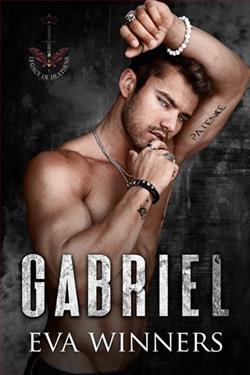Page 149 of When I Picture You
In her car after the party, Renee checked if there was a music video for “Starcrossed” with a knot of dread in her stomach. Thankfully, there wasn’t. Renee couldn’t handle seeing their love story played out by anyone else. But her search turned up a few results she didn’t expect, from Lo-Lites up in arms about the song.
QueerLo-Lites.
Renee felt hot all over as she read the posts. The song’s lyrics were too queer-coded to have registered with mainstream homophobes,but the sapphics had caught every reference. One person said it sounded like a Mad Libs of lesbian stereotypes. But instead of embracing the song, these same fans despised it as gay pandering from a straight artist. If Lola wanted to make queer music, she had to come out, otherwise it was cultural appropriation. Renee didn’t think that was how cultural appropriation worked, but the public’s lack of media literacy was the least of her concerns.
Renee drove home intoxicated by an emotional cocktail of genuine rage mixed with the burning desire to take Lola in her arms and hold her. After all the speculation and conspiracy theories, Lola’s queer fans were rejecting her? Everyone had their own challenges to face when they came out. Queer peopleknewthat, yet they dared to act like they were experts on her situation.They’dnever had to deal with millions of people publicly debating their sexual orientation!
Although, Renee realized as she parked her car, hadn’t she herself been guilty of the same thing? She’d dismissed what coming out meant for Lola’s business. Seeing the reaction of Lola’s queer fans made Renee sick, but she felt sure that Lola had considered this. Lola considered everything. If she hadn’t felt comfortable enough to share it with Renee, that was Renee’s fault too.
She made it to her room and dropped her gear, morose again. How could she have not understood? She was about to throw herself on her bed and cry, again, but wallowing in self-pity wouldn’t make things right with Lola.
At least she could let Lola know she still cared.
Renee dried her eyes and opened her computer.
AT 5 A.M., she attached the finished video to an email and wrote out a brief message, but didn’t send it. Lola probably didn’t want to hear from her, let alone watch her music video, and if she did, she’d probably think Renee was still trying to pressure her into making the film.
She closed the computer and went to sleep.
When she woke up, it was early afternoon. She watched last night’s work. In daylight, it was a little ridiculous. So sweet and sincere and romantic, it was the kind of thing that might play at a wedding while Renee rolled her eyes through the whole thing.
It was the kind of thing Lola loved.
Still, she hesitated. Then her eyes caught on the top right of her screen, on the date.
It was Valentine’s Day.
Renee hit send.
40
Lola adjusted her glasses in the Zoom video of herself. There were still a few minutes before Zoe Mitchell joined for her interview, and Lola was nervous.
She realized she’d misplaced her copy of Zoe’s resume. Her desk was a mess. The overly designed office she’d once hated had become a command center in the frenetic last few weeks. An extra workstation had been added for Cassidy, and a whiteboard, scribbled with multicolored to-do lists. The designer chairs were stacked with books on queer liberation and nonprofit management and community organizing, with dog-eared pages and sticky notes marking important passages. A Progress Pride flag was tacked up on the wall.
Lola dug through a folder, yanked out the highlighter-covered resume, and reviewed it, as if she hadn’t already memorized it. Zoe Mitchell had a master of public administration and ten years of experience at the Houston LGBTQ+ Center. She’d testified before government commissions and organized marches and lobbied against anti-trans bills. On top of all her qualifications, as a trans woman of color, she’d bring perspective and experience to the Star Sign Foundation that Lola could not.
The Star Sign Foundation.
The project was still so new that even thinking the name sent Lola’s stomach fluttering. That moment on the plane a few weeks agohad galvanized something in Lola. It was suddenly crystal clear that she had the means to make a difference in people’s lives—she’d just been blinded by her own problems. She threw herself into learning—meeting with experts and activists, reading more than she ever had—to figure out how she could best serve the queer community, what was most needed, what voices to listen to and elevate. She’d known the contours of major issues, like violence against trans women, the specific issues faced by queer people of color, the continued lack of legal protections, and the fight to protect trans kids, but now she couldn’t believe how superficial she’d allowed her concern to be. This time, she wouldn’t be satisfied by writing a check and attending a gala.
Still, she couldn’t do it all on her own—and it wouldn’t have been right to. Lola knew she was a wealthy, white cis woman who passed for straight so easily she’d done it with the eyes of the world on her for a decade. Also, she was a professional pop star who might know the first thing about running a foundation, but not the second or third. She needed help.
A Black woman with honey-colored hair in glossy waves appeared on the screen.
Lola’s face lit up. “Zoe! I’m Lola. Thank you so much for meeting with me.”
“I’m excited to hear more about this undertaking.” Zoe smiled politely, but she didn’t look starstruck or overeager. If anything, she looked skeptical. That was good.
“It’s still in the early stages, but I’ll take you through what I’ve planned so far.”
Lola explained that she’d earmarked $15 million of her own money and a percentage of her income off the next album in perpetuity for Star Sign. The goal was to supplement those funds with donations from her famous connections. She’d tie Star Sign into everypromotion she did for her own work, giving it the kind of attention nonprofits dreamed of. While Lola handled fundraising, Zoe—if she took the job—would oversee programming. So far, Lola decided that the foundation would take a three-pronged approach to supporting the queer community: micro-grants for things like name changes, medical expenses, and emergencies; a legal defense fund; and political lobbying to advocate for legal protections. There was so much still to do, Lola warned. They needed a board and a charter, real office space, employees. Right now, all they had was a web domain. But Lola would do anything to make this work.
“It’s ambitious,” Zoe said. “I’ll admit, I’m intrigued. You don’t often get the chance to build something from the ground up. But I have to ask why you’re doing this.”
Lola hesitated. She hadn’t asked Zoe to sign an NDA. If Lola wanted to work with Zoe, she would have to trust her. And if she wanted to come out, she’d have to get used to, well, coming out.
“I’m queer myself,” she said. “That’s not public knowledge at the moment. Recently, it really clicked for me that I’d been so focused on what coming out means for me personally that I never really considered what it could mean to others. What I coulddofor others.”















